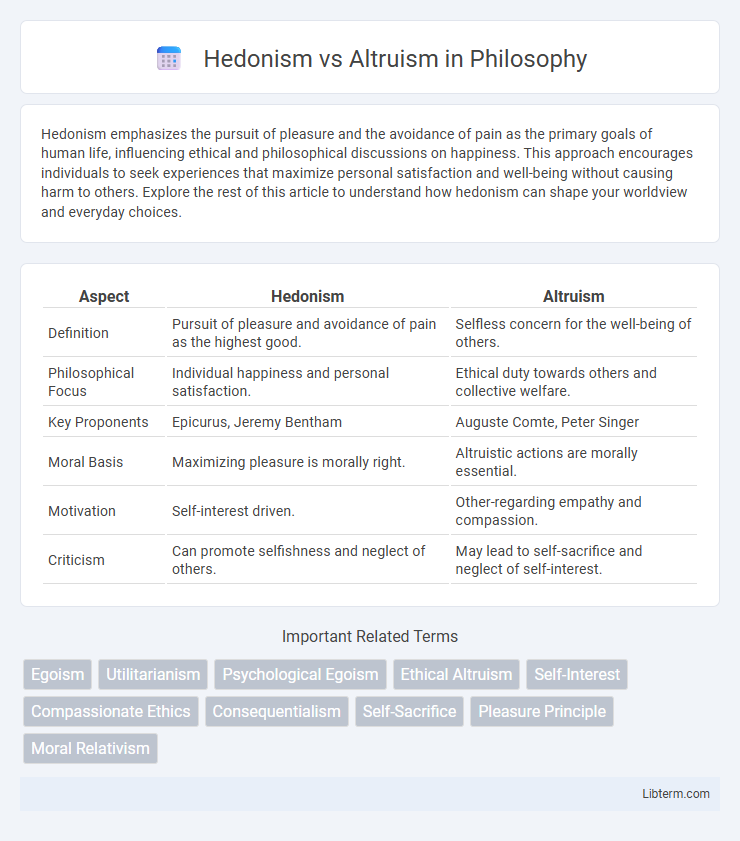Hedonism emphasizes the pursuit of pleasure and the avoidance of pain as the primary goals of human life, influencing ethical and philosophical discussions on happiness. This approach encourages individuals to seek experiences that maximize personal satisfaction and well-being without causing harm to others. Explore the rest of this article to understand how hedonism can shape your worldview and everyday choices.
Table of Comparison
| Aspect | Hedonism | Altruism |
|---|---|---|
| Definition | Pursuit of pleasure and avoidance of pain as the highest good. | Selfless concern for the well-being of others. |
| Philosophical Focus | Individual happiness and personal satisfaction. | Ethical duty towards others and collective welfare. |
| Key Proponents | Epicurus, Jeremy Bentham | Auguste Comte, Peter Singer |
| Moral Basis | Maximizing pleasure is morally right. | Altruistic actions are morally essential. |
| Motivation | Self-interest driven. | Other-regarding empathy and compassion. |
| Criticism | Can promote selfishness and neglect of others. | May lead to self-sacrifice and neglect of self-interest. |
Understanding Hedonism: The Pursuit of Pleasure
Hedonism centers on the belief that the pursuit of pleasure and intrinsic happiness is the highest good and primary motivation for human behavior, emphasizing sensory enjoyment, emotional satisfaction, and personal well-being. Philosophers like Epicurus argued that simple pleasures, such as friendship and moderate living, lead to true contentment rather than unchecked indulgence. Modern psychological research supports hedonistic principles by linking the pursuit of pleasurable experiences to increased dopamine levels and enhanced mental health outcomes.
Exploring Altruism: The Drive to Help Others
Altruism represents a profound motivation rooted in empathy and selflessness, driving individuals to prioritize others' well-being without expecting personal gain. Neuroscientific studies reveal that altruistic behavior activates reward centers in the brain, highlighting its intrinsic value. Social psychology emphasizes that acts of kindness and cooperation enhance communal bonds, promoting societal harmony and resilience.
Historical Perspectives on Hedonism and Altruism
Hedonism, rooted in ancient Greek philosophy with figures like Epicurus promoting pleasure as the highest good, contrasts sharply with altruism, which finds its earliest ethical formulations in Stoicism and Christian teachings emphasizing selflessness and the welfare of others. Throughout history, hedonistic views have shaped many materialistic and individualistic cultures, while altruistic ideals underpin communal and religious moral systems aimed at social cohesion and collective well-being. The dynamic tension between these philosophical traditions continues to influence contemporary debates on human motivation, ethics, and social behavior.
Psychological Foundations: What Drives Human Behavior?
Hedonism and altruism represent contrasting psychological motivations underlying human behavior, where hedonism emphasizes the pursuit of personal pleasure and avoidance of pain, driven by the brain's reward system and dopamine pathways. Altruism involves selfless concern for the well-being of others, often linked to empathy, social bonding, and activation of reward-related neural circuits such as the anterior cingulate cortex and oxytocin release. Research in behavioral psychology and neuroscience highlights that both motivations coexist, influenced by evolutionary pressures and situational factors shaping complex human decision-making.
Ethical Implications: Self-Interest vs. Social Good
Hedonism, emphasizing self-interest and the pursuit of personal pleasure, raises ethical questions about potential neglect of others' welfare and societal responsibilities. Altruism prioritizes social good by encouraging actions that benefit others, often at a personal cost, highlighting moral frameworks centered on empathy and collective well-being. The ethical implications hinge on balancing individual desires with societal needs, questioning whether moral worth is determined by self-gratification or contributions to the common good.
Hedonism and Altruism in Modern Society
Hedonism in modern society emphasizes the pursuit of personal pleasure and immediate gratification, often driving consumerism and self-indulgent lifestyles. Altruism, contrastingly, promotes selfless concern for the welfare of others, fostering community support, philanthropy, and social responsibility. The dynamic tension between hedonistic desires and altruistic actions shapes ethical debates, influencing policies on social welfare, environmental sustainability, and corporate governance.
Can Pleasure and Compassion Coexist?
Pleasure and compassion coexist as complementary forces within human motivation, where hedonic desires for personal satisfaction intersect with altruistic drives to support others' well-being. Neuroscientific studies reveal overlapping brain regions activated by both experiencing pleasure and performing compassionate acts, suggesting intrinsic links between self-gratification and empathy. Philosophical perspectives argue that pursuing personal happiness can align with altruistic behavior when compassionate actions enhance overall life satisfaction and social connectedness.
Real-World Examples: Balancing Pleasure and Generosity
Hedonism emphasizes the pursuit of personal pleasure, evident in luxury lifestyle choices and experiences such as exclusive vacations or gourmet dining. Altruism manifests in acts of generosity, including charitable donations or volunteering for social causes, prioritizing others' well-being over individual gratification. Many individuals balance these approaches by integrating pleasurable activities with philanthropic efforts, such as hosting fundraising events or supporting ethical products that combine enjoyment with social impact.
Cultural Influences on Hedonistic and Altruistic Values
Cultural influences significantly shape the prevalence of hedonistic and altruistic values, with individualistic societies often promoting hedonism through emphasis on personal pleasure and self-fulfillment, while collectivist cultures foster altruism by prioritizing community welfare and social harmony. Studies in social psychology demonstrate that Eastern cultures, such as Japan and China, typically encourage altruism rooted in Confucian principles, whereas Western cultures, including the United States and Western Europe, tend to highlight hedonistic pursuits aligned with consumerism and individual rights. Cross-cultural research highlights that these values are reinforced through social norms, education systems, and media, which collectively influence individuals' motivations toward either self-interest or selflessness.
Navigating Life: Finding Harmony Between Self and Others
Navigating life through the balance of hedonism and altruism involves understanding the interplay between personal pleasure and the well-being of others. Emphasizing mindful hedonistic pursuits can enhance individual happiness while fostering empathy and compassion promotes social harmony. Achieving equilibrium between these values supports psychological health and strengthens community connections.
Hedonism Infographic

 libterm.com
libterm.com